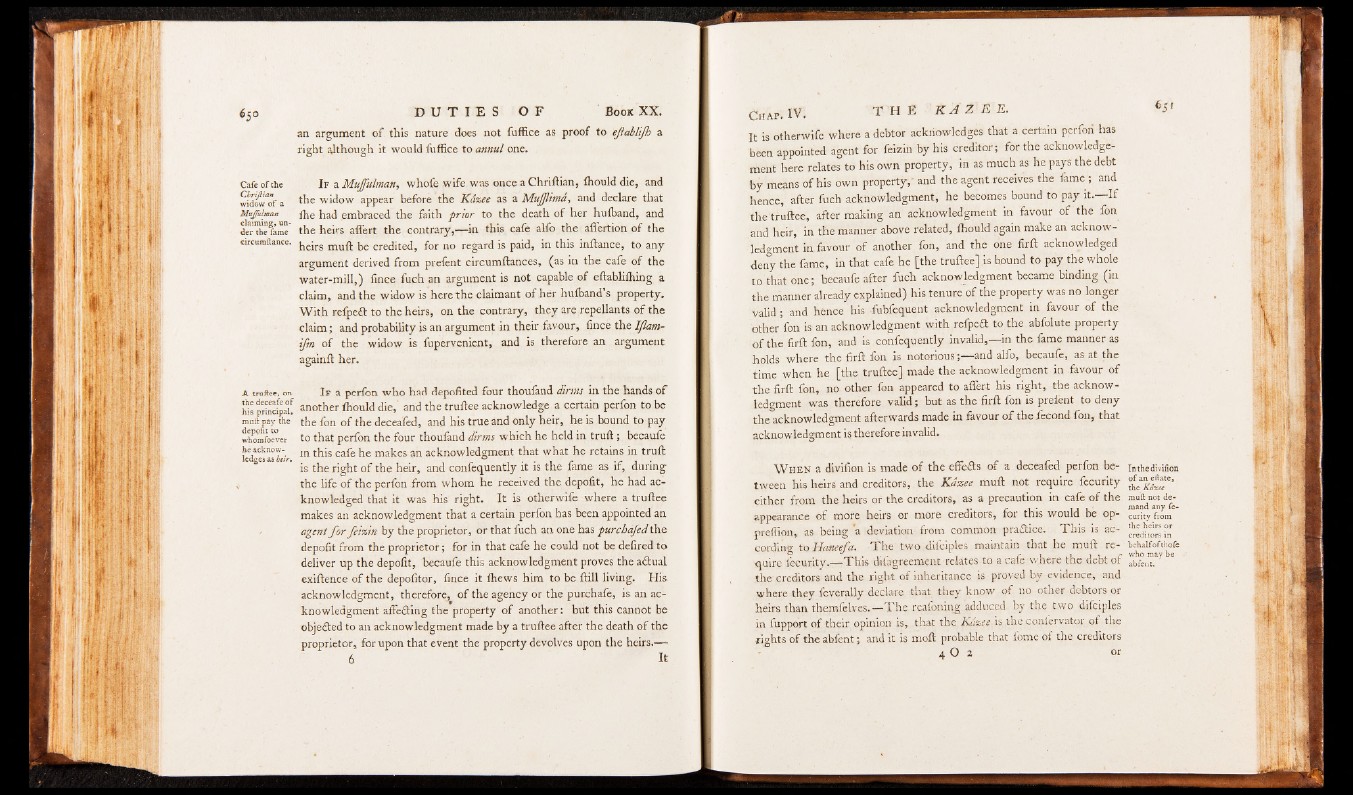
Cafe o f the
Cbrijiian
widow o f a
Mujfulman
claiming, under
the fame
circumflance.
A truftee, on
the deceafe o f
his principal,
muft pay the
depofit to
whom foe ver
he acknowledges
as heir.
D U T I E S OF
an argument of. this nature does not fuffice as proof to ejiablijh a
right although it would fuffice to annul one.
If a Mujfulman, whofe wife was once a Chriftian, ffiould die, and
the widow appear before the Kdzee as a MuJJlima, and declare that
fhe had embraced the faith prior to the death of her huffiand, and
the heirs affert the contrary,— in this cafe alfo the affertion of the
heirs muft be credited, for no regard is paid, in this inftance, to any
argument derived from prefent circumftances, (as in the cafe of the
water-mill,) lince fuch an argument is not capable of eftabliffiing a
claim, and the widow is herethe claimant of her huffiand s property.
With refpeft to the heirs, on the contrary, they are repellants of the
claim; and probability is an argument in their favour, fince the Iflam-
ifm of the widow is fupervenient, and is therefore an argument
againft her.
I f a perfon who had depofited four thoufand dirms in the hands of
another ffiould die,' and the truftee acknowledge a certain perfon to be
the fon of the deceafed, and his true and only heir, he is bound to pay
to that perfon the four thoufand dirms which he held in truft ; becaufe
m this cafe he makes an acknowledgment that what he retains in truft
is the right of the heir, and confequently it is the fame as if, during
the life of the perfon from whom he received the depofit, he had acknowledged
that it was his right. It is otherwife where a truftee
makes an acknowledgment that a certain perfon has been appointed an
agent fo r feizin by the proprietor, or that fuch an one has purchafed the
depofit from the proprietor; for in that cafe he could not be defired to
deliver up the depofit, becaufe this acknowledgment proves the adtual
exiftence of the depofitor, fince it ffiews him to be ftill living. His
acknowledgment, therefore, of the agency or the purchafe, is an acknowledgment
affecting the property of another: but this cannot be
objefted to an acknowledgment made by a truftee after the death of the
proprietor, for upon that event the property devolves upon the heirs.—>
6 It
It is otherwife where a debtor acknowledges that a certain perfon has
been appointed agent for feizin by his creditor; for the acknowledgement
here relates to his own property, in as much as he pays the debt
by means of his own property,’ and the agent receives the fame ; and
hence, after fuch acknowledgment, he becomes bound to pay it.— If
the truftee, after making an acknowledgment in favour of the fon
and heir, in the manner above related, ffiould again make an acknowledgment
in, favour of another fon, and the one firft acknowledged
deny the fame, in that cafe he [the truftee] ,is bound to pay the whole
to that one; becaufe after fuch acknowledgment became binding (in
the manner already explained) his tenure of the property was no longer
valid ; and hénce his fubfequent acknowledgment in favour of the.
other fon is an acknowledgment with refpeft to the abfolute property
of the firft fon, and is , confequently invalid,— in the fame manner as
holds where the firft fon is notorious ;— and alfo, becaufe, as at the
time when he [the truftee] made the acknowledgment in favour of
the firft fon, no other fon appeared to alfert his right, the acknowledgment
was therefore valid; but as the firft fon is prefent to deny
the acknowledgment afterwards made in favour o f the fécond fon, that
acknowledgment is therefore invalid.
AVhen a divifion is made of the cffecls of a deceafed perfon be- inthedivifioa
tween his heirs and creditors, the Kdzee muft not require fecurity
either from the heirs or the creditors, as a precaution in cafe of the mult not dev
£ U* n i ' mand any reappearance
of more heirs or more creditors, 101 this would be op- curity from
prefilon, as being a deviation from common praftice. This is ac-
cord in* to Haneefa. The two difdples maintain that he muft re- behalfofthdfe
quire fecurity.— This diiagreement relates to a cafe where the debt of rbfenT.ay
the creditors and the right of inheritance is proved by evidence, and
where they feverally declare that they know of no other debtors or
heirs than themfelves.— The reafoning'adduced, by the two difciples
in fupport of their opinion is, that the Kdzee■ is the confervator of the
rights of the abfent; and it is moft probable that fome of the. creditors
4 O 2 or